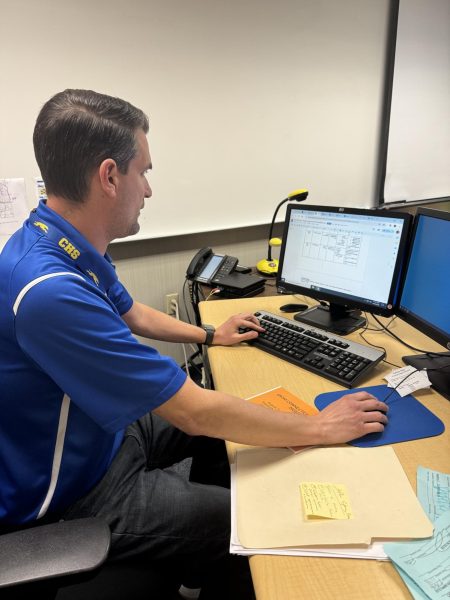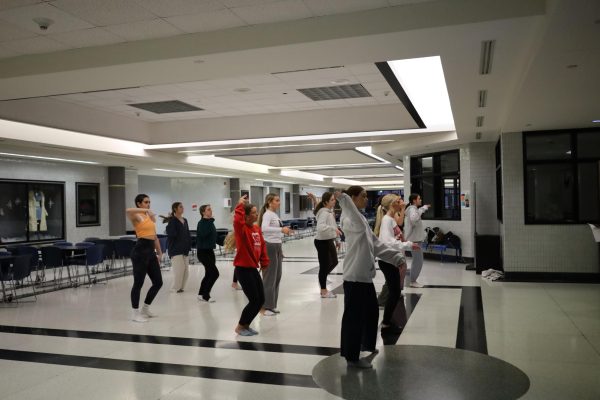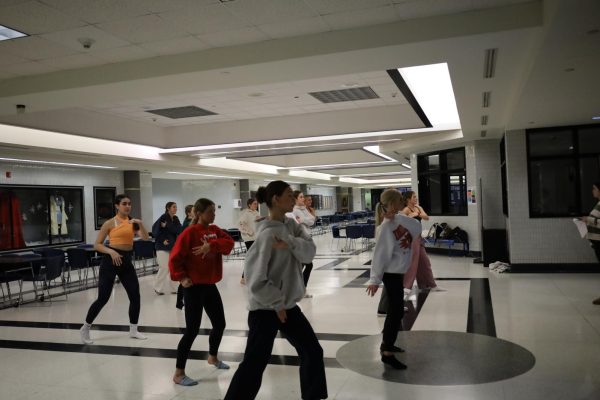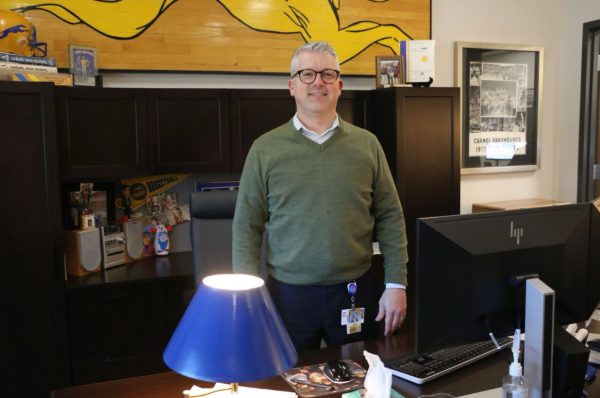Taking a Knee: CHS athletes and coaches reflect on recent national anthem protests
During the past year, professional athletes have begun to protest and demonstrate their displeasure of the political changes being made during the national anthem played at the start of games. Originally, the protests and demonstrations started in the National Football League (NFL). Former San Francisco 49ers quarterback, Colin Kaepernick, was the first player to protest during the anthem. His actions led to a mixed response amongst Americans and other athletes. Many people felt that the protest was wrong, while others agreed with Kaepernick’s decision. The case is the same for athletes and coaches at CHS.
Frank Dixon, women’s soccer Head Coach, said he believes what the players are doing is wrong, but they have the right to do so.
“They have the right to (kneel during the anthem), but I don’t have to like it,” Dixon said.
Babacar Diatta, men’s soccer player and sophomore, said he agrees with Dixon.
“Its right to do what you believe and players have the right to be able to protest,” Diatta said.
One reason the athletes chose to protesting the anthem was police brutality. Over the past few years, incidents African American people being killed unjustly by police have highlighted news headlines. The public’s view of the police has since then been mixed to an unprecedented level. Dixon said he believes, that in general, the police are good people.
“They’re just good people, but there are bad apples. You will always have people in authority that are not good people,” Dixon said.
Joshua Snively, football player and sophomore, has a father who is a police officer. Snively said he believes that the act of protesting the anthem is disrespecting policemen and women. “Kneeling during the anthem is not a protest it’s an act of disrespect, the cops and military are getting offended,” Snively said.
The idea of standing up for what you believe in is an important factor in events such as protests. According to American Veterans of Foreign Wars, during the Vietnam War, outrage over the draft, which caused people to be forced into military service, caused people to protest. An estimated 125,000 Americans fled to Canada to avoid the draft while others stayed and burned their draft cards. Dixon, a Vietnam War veteran, said he has a certain amount of respect for the protesters.
“I have no respect for the people that ran to Canada, but lots of respect for the people that stayed and protested,” Dixon said.
Diatta said he also agrees that standing up for what you believe in is a deciding factor in the support of protesters.
“People can see how it’s not disrespectful when they learn more about it and how it’s right to do what you believe,” Diatta said.
One thing the three can agree on is that if a CHS athlete were to protest, they wouldn’t be outraged.
Dixon said he believes this. “I would not like it, but you’re gonna do what you’re gonna do and students have the right to do things just like anybody else.”
Snively said he believes that even though you may not agree with a teammate if they were to protest, it’s important to understand them.
“It’s always important to respect your teammates,” Snively said.
Your donation will support the student journalists of Carmel High School - IN. Your contribution will allow us to purchase equipment and cover our annual website hosting costs.


































![British royalty are American celebrities [opinion]](https://hilite.org/wp-content/uploads/2024/03/Screenshot-2024-03-24-1.44.57-PM.png)


















![Review: “Suits” is a perfect blend of legal drama and humor [MUSE]](https://hilite.org/wp-content/uploads/2024/04/unnamed-1.png)
![Chelsea Meng on her instagram-run bracelet shop [Biz Buzz]](https://hilite.org/wp-content/uploads/2024/04/IMG_2446-1200x838.jpg)
![Review: Quiet on Set: The Dark Side of Kids TV is the long awaited exposé of pedophilia within the children’s entertainment industry [MUSE]](https://hilite.org/wp-content/uploads/2024/04/unnamed.jpg)
![Review: “The Iron Claw” cannot get enough praise [MUSE]](https://hilite.org/wp-content/uploads/2024/04/unnamed.png)
![Review: “The Bear” sets an unbelievably high bar for future comedy shows [MUSE]](https://hilite.org/wp-content/uploads/2024/03/unnamed.png)
![Review in Print: Maripaz Villar brings a delightfully unique style to the world of WEBTOON [MUSE]](https://hilite.org/wp-content/uploads/2023/12/maripazcover-1200x960.jpg)
![Review: “The Sword of Kaigen” is a masterpiece [MUSE]](https://hilite.org/wp-content/uploads/2023/11/Screenshot-2023-11-26-201051.png)
![Review: Gateron Oil Kings, great linear switches, okay price [MUSE]](https://hilite.org/wp-content/uploads/2023/11/Screenshot-2023-11-26-200553.png)
![Review: “A Haunting in Venice” is a significant improvement from other Agatha Christie adaptations [MUSE]](https://hilite.org/wp-content/uploads/2023/11/e7ee2938a6d422669771bce6d8088521.jpg)
![Review: A Thanksgiving story from elementary school, still just as interesting [MUSE]](https://hilite.org/wp-content/uploads/2023/11/Screenshot-2023-11-26-195514-987x1200.png)
![Review: When I Fly Towards You, cute, uplifting youth drama [MUSE]](https://hilite.org/wp-content/uploads/2023/09/When-I-Fly-Towards-You-Chinese-drama.png)
![Postcards from Muse: Hawaii Travel Diary [MUSE]](https://hilite.org/wp-content/uploads/2023/09/My-project-1-1200x1200.jpg)
![Review: Ladybug & Cat Noir: The Movie, departure from original show [MUSE]](https://hilite.org/wp-content/uploads/2023/09/Ladybug__Cat_Noir_-_The_Movie_poster.jpg)
![Review in Print: Hidden Love is the cute, uplifting drama everyone needs [MUSE]](https://hilite.org/wp-content/uploads/2023/09/hiddenlovecover-e1693597208225-1030x1200.png)
![Review in Print: Heartstopper is the heartwarming queer romance we all need [MUSE]](https://hilite.org/wp-content/uploads/2023/08/museheartstoppercover-1200x654.png)























![Seniors Jillian Rang and Athul Ramkumar practice their presentation at the DECA state competition on March 5, 2024. Arya Patel, DECA paper head and junior, said, As they [students] begin to make their final preparations, its important to remember that making it to this point is an incredible achievement.](https://hilite.org/wp-content/uploads/2024/04/IMG_8285-600x400.jpg)




